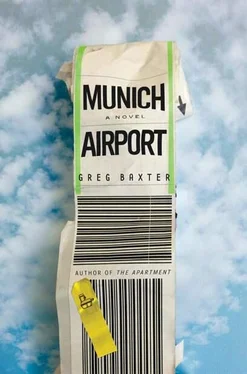On the departures board, beside our flight, it reads Please Wait.
When I flew home for my mother’s funeral, my father picked me up from the airport. I had hoped Miriam would come along, but it was just my father. He was standing at arrivals in a white polo shirt and tan shorts, and sockless in a pair of dark-brown penny loafers. He looked like a man who had spent a day grieving on his own, privately, variously doing things around the house, suddenly weeping into his hands, then continuing, looking out the window, thinking he had better mow the lawn, then sitting on the couch for a long time holding something that reminded him of her, then getting up and going through the mail, and so on. When I saw Miriam, we hugged. I asked her how she was and she said, I’m good, how are you? I admitted I was a bit shocked. I had been home just a few days before. My mother’s condition had gotten very bad, and I’d come home with the expectation that she would be dead within days. I sat beside her in the hospice. I watched the television in her room. I read books beside her. I held her hand. Miriam was there as well. My mother was mostly unconscious or, when conscious, very groggy, so we couldn’t really converse with her. She was very pale and drawn, pink around the eyes and nostrils. If Miriam’s starvation had been an attempt to re-create my mother’s death — which was improbable, but was at least more plausible than recreating, for my father’s sake, the death of Charlemagne — then she had failed, because my mother, though drawn and sickly, did not look horrifying, as Miriam had looked in the morgue. While we sat around her bed, we told her she looked well. She’d received many cards, and we read them aloud to her. Miriam told her that she planned to skip her final year of college and leave home, go traveling, and my mother, who didn’t seem alert enough to hear her — and to the astonishment of her doctors — made a recovery. A day later, we were all in her room, speaking with her, she was smiling and her eyes were clear. I offered to quit my job and come home to be with her, but my mother refused to let me. She said, For God’s sake don’t come back here, you live in London now. So I returned to London, went back to work, and that very day, the Monday I walked back into the office, she died. I got a call from my father. He was calm but obviously very tired. I asked if she had died peacefully. He said, Well, she died. I walked into my boss’s office, sat down in the chair across from his desk and said, without any sadness but also without levity, You’re not going to believe this. This was back in the days when airlines gave real hardship discounts for deaths in the immediate family, and they put me on a plane for almost nothing.
My mother’s funeral was very large. Hundreds of people came. Mostly women whom my mother knew through her charity, or who were connected to the charity, or had benefited from her charity. The women my mother knew had arranged the house as a giant funeral hall, and Miriam and I sat on chairs against the wall. I don’t think we were trying to look pitiful, but we probably looked pitiful. Miriam was talking about moving to Berlin. She wore her hair very short. A lot of people stood over us and counseled us. A lot of people put their hands on us. We looked up and smiled at them. I suspect the house will be arranged, for Miriam’s funeral, in a similar fashion — arranged by the same women who arranged the house for my mother’s funeral — and I will sit down as I sat then, and be counseled, but now I am probably too unfamiliar for anyone to touch, or people will refuse to touch me because I look like bad luck.
After my mother’s funeral, in the evening, our father went for a swim and we watched him from the poolside, sitting in white plastic chairs. It was warm and muggy. Everyone had gone. The last people who left had cleaned everything, arranged the house back the way it was, and promised to return the next day to clean it some more. My father told them there wasn’t any way to make the place cleaner, so it wasn’t necessary. Everything had been returned to its place with a spooky exactitude, and I went around the house wishing they had left it as a funeral parlor, or a mess, because the house needed to be changed, and we needed to be the ones who changed it. But there was nothing to do, nothing at all, so my father went swimming. He’d been struggling with his big book, the book for which his publisher had already waited years, and he’d abandoned it, he said, because on top of all his other duties he was tending to my mother, and now he felt the book was pointless. The day of my mother’s funeral had been a strange one for my father, because all day my mother’s friends and colleagues had been forgiving him. Not explicitly, but by their affection and kindness they forgave all of his sins — his self-deceit, his tyranny, his absence, his selfishness, his mediocrity. He was cleansed, and he swam around the pool that night, in front of me and Miriam, with a pacific look on his face, and a pacific way of speaking to us, that you often associate with people who have found a religion. The water was lit by a blue-white light in the deep end. As my father moved and swam around in it, the waves he made contained tiny lines of light along their apexes, and, underneath him, refracted light moved in large white tectonic plates along the white bottom of the pool. We watched him swim for an hour. He did almost all the talking, which was strange, because he was never very talkative with us. Our mother had been the talker, but from this moment onward he would accept the role in her absence. We let him talk and talk and talk, and we couldn’t leave, I think, until we witnessed him talk his way out of the reassurances he’d received that our mother had been happy, that she had accepted his absences because it was part and parcel of his eminence, the eminence they assured him was real, and that even though things had not gone as he’d planned, he had two fine children who had what he had never had, a community, a home, a place, belonging, and so on. We had to be certain he’d rejected their forgiveness, we had to wait until he felt replenished with shame and truth. My father once wrote, in a review of a book about the Holocaust, that shame, not curiosity, is what drives the historian. The historian of tragic events, especially, he wrote, must cultivate guilt, must find infinite ways to implicate himself in every injustice and atrocity that has ever transpired, and be unworthy of all the heroism and courage that has resisted injustice. And then he must strap his shame down, paralyze it, let it speak but not let it gesticulate. He stated, in his review, that the author of the book had cultivated guilt, felt unworthy of heroism, and was on his way to an illuminating and important history book, but he forgot to strap his shame down, and he had therefore produced a book of gesticulations, a rather stylish book. The result was arrogance — sentimentality, flourish, lyricism, hyperbole, opinion — all symptoms of arrogance. In histories of suffering, style is unconscionable. The review was published in the New York Review of Books , and I thought it was a good piece — I called and told him so, and I was so proud to see him being so tough and high-minded — and I have, in ways that I have yet to fully unravel or even begin to articulate, tried to translate that way of thinking into my own work. Our house was dark. The clouds had soft light in them, a reflection of the town and some refineries. After an hour, Miriam mentioned that she’d felt a little sickened by the way some of mother’s friends kept going on about Christ, about her salvation, about her eternal peace, and about what a strong faith she had. I know, I said, it was hard to take. Miriam said, Mom would have found it sickening, too. My father said, Your mother would not have wanted her friends to say those things to you, and so far as I know, none of them had any idea about the nature of her faith, because she was so private about it, but you should know something, something that will surprise you. He stopped talking for a moment and made little splashes with his cupped hands. We waited and he decided to tell us. He said, Your mother found Christ before she died. I said, That can’t be true. He said, It is true, it’s the truth. Miriam said, She probably just told you that. I said, She was weakened and afraid. My father said, No, not because she was afraid — and here he sank down, half-reclined upon the water’s buoyancy, so that his face was looking upward, up at the clouds, and his head was submerged so that the waterline covered his ears, so that his voice, to him, would be slightly disembodied by the weight of the water — but because Christ appeared to her in a vision and He spoke. My father stood up slightly. He seemed not to believe he had said what he said. His head and shoulders were out of the water. What did He say? I asked. My father said, You know, just the typical religious stuff, I guess, she actually never told me, she just said that He was suffering, and He took her pain away. My father looked up, saw our puzzled disappointment, and lowered his head, and we knew for sure that he didn’t feel forgiven anymore.
Читать дальше











